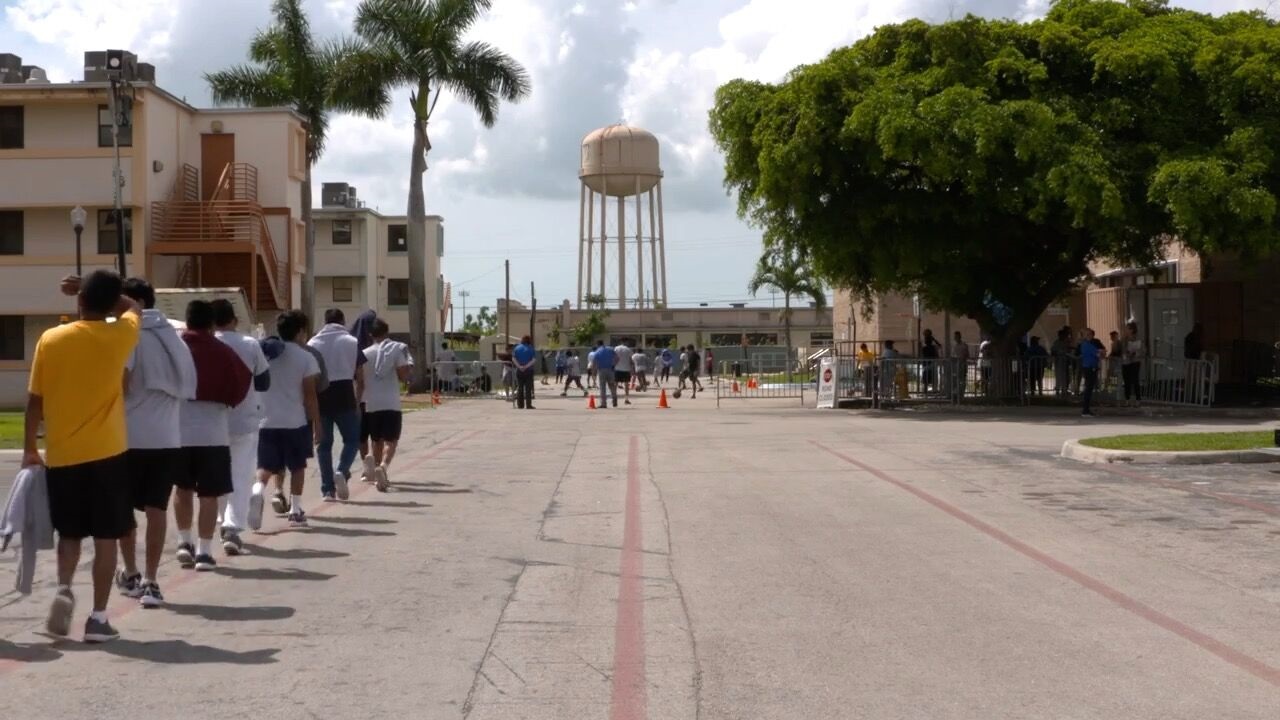
At Homestead Detention Center, children can spend weeks, even months in custody – which can cause lasting trauma and incalculable costs to children, families, and our communities. Public domain
Children belong in schools and homes, not in prison camps. But today, the U.S. government is holding hundreds of children in detention at the border and in centers like the one in Homestead, Florida—and that number keeps growing.
Most of these children have fled violence and poverty in Central America and are seeking asylum in the United States. Many were separated from their family members or relatives after crossing into the U.S.
But instead of being released to family members or other sponsors in the community to await hearings on their cases, many of these children will spend weeks or months in detention – with lasting traumatic effects.
Now is the time to stand with migrants from Central America and other parts of the world who are seeking safety and peace. Please join AFSC, community members, immigrant advocates, and many others in demanding the shutdown of Homestead Detention Center – and urging Congress to do everything in their power to end child detention.
Here’s what you need to know about Homestead and the impacts of child detention:
Homestead detention center is a child prison.
Children sleep in military-like dorms and rooms that can hold up to 250 kids. They’re not allowed to leave the compound. And they’re closely monitored by guards and are subjected to a strict no-hugging policy, even among siblings.
Homestead circumvents federal law that protect children in custody.
Since 1997, the Flores settlement has limited the amount of time the government can detain children. It also limits the detention of children and families to facilities with certain licensing and standards.
But because Homestead is considered an “emergency influx shelter” for children – the only one in the U.S. – the Flores settlement does not apply. This loophole leaves children unprotected from the harms of indefinite detention.
It’s unclear whether Homestead provides children with adequate education and mental health support.
Since Homestead has no state supervision, even the Miami-Dade school district does not know what kind of programming the private corporation running the facility is providing to children in detention. Miami-Dade School Superintendent Alberto Carvalho has criticized the shelter for its lack of transparency and expressed concerns about the inequity of the quality and standards of education provided to children in detention.
Detaining young people is extremely harmful.
Keeping children in detention causes lasting trauma – and the cost of that to children, families, and our communities is incalculable. The American Association of Pediatrics had said that even short periods of time in detention can cause psychological trauma and pose long-term mental health risks.
Deliberate policies under the Trump administration are driving the increase in child detention.
The Trump administration is manufacturing the need to detain children as part of its anti-immigrant agenda. Policies like family separation and the criminalization of immigrants is what is driving increasing numbers of “unaccompanied” children. As thousands of parents were ripped from their children and deported last year, the children were placed in care of the Office of Refugee Resettlement (ORR) in the Department of Health and Human Services (HHS), and many of them are at Homestead.
In addition, the Department of Health and Human Services has an information-sharing agreement with the Department of Homeland Security, which makes sponsors afraid to come forward, as at least 170 have been detained and face deportation. These two factors – and not just the increase in children seeking asylum at our borders – have significantly increased the number of children in the custody of the Office of Refugee Resettlement.
Corporations are profiting from detaining children.
It’s estimated that Homestead costs taxpayers $500,000 a day to operate – and companies are benefiting. Comprehensive Health Services (CHS), one of the largest government medical contractors in America, manages Homestead – providing medical, mental health, educational, and other services.
CHS was acquired by Caliburn International Corp. last year. After months of community organizing and advocacy to shut down the detention center, Caliburn canceled its plans to sell $100 million in shares on the stock market, citing “market forces” – an indicator that attention from the media, activists, and others is making an impact.
In May 2019, former White House Chief of Staff John Kelly joined the board of Caliburn International, drawing criticism from immigrant advocates, human rights groups, and members of Congress. An ethics watchdog group, Citizens for Responsibility and Ethics in Washington, has since filed a request for government documents related to Kelly’s relationship with Caliburn.
Read more about the corporate interests behind Homestead detention center on AFSC's Investigate website.
Homestead must be shut down immediately.
The Office of Refugee Resettlement must close Homestead immediately – and stop its complicity in breaking families and communities apart. Instead the office should work to unite children with their parents or sponsors as quickly as possible. That includes ending collaborations with the Department of Homeland Security that interfere with this process.
Congress must also do everything in its power to shut down Homestead detention center and work to end child detention. Members should support legislation, like the Shut Down Child Prison Camps Act (HR1069/SR397) and Families Not Facilities Act (S388), that would prohibit the use of emergency influx facilities and bar the Department of Health and Human Services from sharing information with the Department of Homeland Security that could lead to the detention and deportation of sponsors in the community.
Contact Congress today!
Stopping child detention is imperative. But the problem extends to the whole system of immigration detention.
Homestead detention center is just one example of the egregious human rights abuses facing immigrant children and adults alike. We must work to keep families, communities, and loved ones together – and push for immigration policies that respect the rights and humanity of all people.